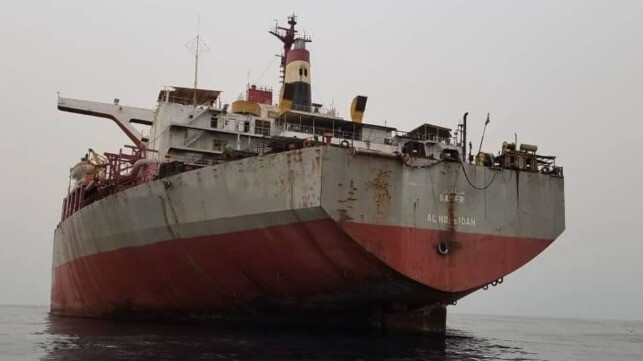Rights Groups Call on Donor Nations to Pay for Aging FSO's Removal

Governments and donors are under renewed pressure to provide funding to the UN to facilitate the cleanup of decaying Yemeni FSO Safer in order to avert an imminent humanitarian and environmental disaster.
A coalition of 19 human rights and humanitarian groups have written an open letter to the U.S., United Kingdom, European Union member states and other UN donor countries to donate $20 million to the UN to support a salvage operation to prevent the ancient tanker from spilling hundreds of thousands of barrels of oil into the Red Sea.
The UN has already warned that Safer, an oil storage tanker moored 32 nautical miles from the key port city of Hodeida, could explode or rupture at any time, threatening an environmental and humanitarian catastrophe. There are fears that the emergency salvage operation will become even more dangerous by October as seasonal winds and currents increase in the Red Sea.
Last month the UN announced that salvage operations could not begin due to insufficient funding, forcing the global body to open a $20 million crowdfunding campaign to make up the funding gap.
The UN requires $144 million to remove oil from the decaying vessel and buy a new replacement ship for Yemen's Houthi rebels. In May, donors pledged $33 million to support the salvage plan, which entails inerting the tanks and transferring of the oil to a secure vessel.
The Safer has been stranded without maintenance off Yemen’s coast since 2015, and it holds an estimated 1.14 million barrels of light crude oil, four times the amount of oil spilled from the Exxon Valdez. If released in its entirety, it would be enough to create the fifth largest oil spill in history. Estimates show the cost of cleanup for an oil spill from the Safer would be at least $20 billion, excluding broader economic consequences.
“The lack of urgency from governments has brought Yemen perilously close to a new humanitarian and environmental disaster. It’s incomprehensible that the UN is now reduced to crowdfunding $20 million when the potential damages could be a thousand times greater. Donors should immediately step up to address this looming risk,” said Michael Page, Human Rights Watch Middle East and North Africa deputy director.
He added that donating $20 million today to end the tanker’s explosion risk means averting a disaster that will cost billions in environmental clean-up costs alone, while the human rights, humanitarian, and other environmental costs will be incalculable.
Apart from Human Rights Watch, the International Crisis Group, Amnesty International, Conflict and Environment Observatory and the International Commission of Jurists are among the 19 groups that have signed the open letter.
The supertanker is at imminent risk of disaster because of increased corrosion from lack of maintenance. The Yemeni state-run Safer Exploration and Production Operations Company, which owns the vessel, has not been able to maintain it since 2015 because of the ongoing Yemeni civil war. Seawater entered the engine compartment in May 2020, heightening concerns about a possible oil spill.
The Houthi authorities that control Hodeida signed a memorandum of understanding with the UN in March, and agreed to facilitate a two-stage UN-coordinated plan to prevent a disaster. The transfer of the oil from the Safer to a secure vessel is the first step. The four-month long operation would cost $80 million, one-quarter of which is still needed. The second stage involves installing a replacement vessel within 18 months. A total of $144 million is required for the entire operation.
Fears abound that an oil spill from the vessel could have serious and long-lasting environmental impact on one of the most important repositories of biodiversity on the planet, possibly destroying coastal wetlands, mangroves, seagrass and coral reefs for generations.
The environmental destruction would have devastating long-term economic consequences for the approximately 28 million people in Yemen, Saudi Arabia, Eritrea, Sudan, Egypt and Djibouti, who rely on these areas for their livelihoods.

that matters most
Get the latest maritime news delivered to your inbox daily.
Given that the Safer is also located close to critical global shipping lanes, there are numerous other harmful economic consequences that would result from a spill, among them being the shutdown of Hodeida’s port. This would affect millions of Yemenis who depend on imports of food and other essential goods. Between 80 and 90 percent of the Yemeni population’s basic needs are delivered by commercial imports and aid, approximately 70 percent of which enter through Hodeida.
“We are deeply concerned about the lack of urgency and slow pace of donations from the international community that has brought Yemen perilously close to a new humanitarian and environmental disaster,” noted the open letter.
